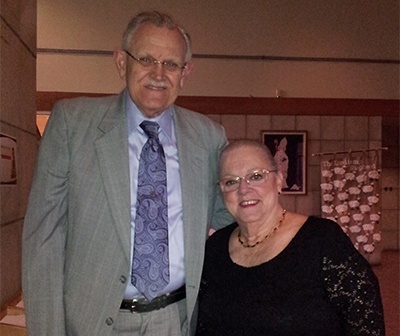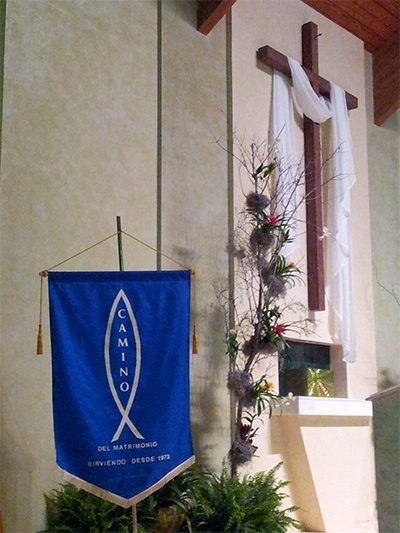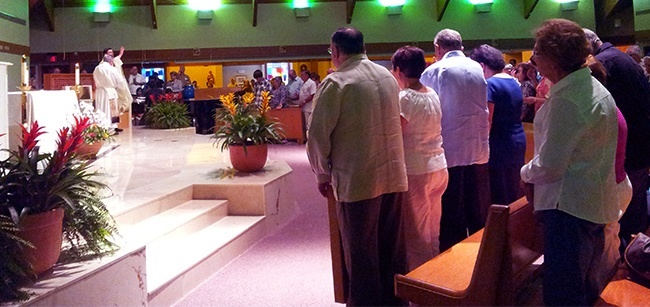By Blanca Morales - Florida Catholic

Photographer: BLANCA MORALES | FC
Pedro and Martha Pelaez, or "Papucho" and "Mamucha" as they prefer to be called, are one of the founding couples of Camino. They have been married for 55 years and served in the ministry for 40 years. "I will serve in Camino till death parts me (from it)," he said.
Those who opt for civil unions in Florida face a 56 percent risk of divorce, while couples who marry in the Catholic Church have a 27 percent divorce rate. Married Catholic couples who attend Mass together have a 2 percent chance of divorce, while those who pray daily together only see a 0.07 percent divorce rate.
Taking these statistics to heart, Camino del Matrimonio (The Way of Marriage), has been preparing couples for the sacrament of marriage in the Archdiocese of Miami for the past 40 years.
It is one of several marriage preparation programs offered by the archdiocese, along with Pre-Cana in Spanish and English and online courses in both languages. Attendance at one of these preparation programs is part of the requirement for receiving the sacrament of marriage in the archdiocese, along with meeting with a priest and completing a premarital evaluation. The archdiocese also recommends taking a course on natural family planning.

Photographer: BLANCA MORALES | FC
The Camino del Matrimonio banner stands on the altar at St. Timothy parish where the 40th anniversary Mass was celebrated by Piarist Father Rafael Cap�, director of SEPI.
Camino is not just a course, however. It is also a movement of people who are spiritually-committed to promoting the sanctity of marriage. Every Camino is put on by volunteers, many of whom have been through the program themselves.
The pastoral plan for the movement, based on Pope Paul VI�s apostolic letter �Evangelii Nuntiandi,� is a result of careful planning and reflection, first under the direction of the late Miami Auxiliary Bishop Agust�n Rom�n and later under Bishop Felipe Estevez, now bishop of St. Augustine, Fla.
Since May 1973, Camino has been preparing couples for marriage both on a spiritual and practical level, relying on scientific studies as well as more recently on Pope John Paul II�s Theology of the Body. At a Camino, engaged couples learn about communication, conflict resolution, responsible parenthood and the sacrament of marriage as observed by the Church.
The movement also offers a Post Camino follow-up program, every second Wednesday of the month free of charge, for any married couples, whether or not they attended a Camino, in order to provide them with more resources and support for a stable, happy marriage.
Having served in the movement for 40 years, founding member Pedro �Papucho� Pelaez has observed that traditional values have been lost to modern views.
�People no longer want marriage,� he said, noting a decline in the number of couples getting married during his years in ministry. �They prefer cohabitation out of convenience.�
His observation falls in line with surveys that indicate that newer generations find marriage obsolete.
But Pelaez, who has been married to his wife Martha, or �Mamucha,� for 55 years, emphasizes that marriage is worth it.
At Camino�s 40th anniversary Mass, celebrated at St. Timothy Church April 27, Piarist Father Rafael Cap�, director of SEPI, refuted the world�s definition of love as being mere feelings, emotions and �butterflies.�
Christ�s commandment is to love as he has loved, said Father Cap� in his homily. �Christ�s love isn�t the world�s love; it�s not Valentine�s Day�s flowers and chocolates. It�s a martyr�s love, a daily surrender until one�s last breath.�
He also noted how the world tells people to love only when it �feels good� and to separate when those feelings wane.
�That�s not Christian love,� he said. �Christ�s love is one that loves the leper everyone rejected, a love that forgives Peter�s denial, one that loves Thomas in spite of his doubt. It�s a love that makes all things new. A heroic love like Christ�s seems humanly impossible, but the saints tell us it is possible through Christ�s strength and love.�

Photographer: BLANCA MORALES | FC
The 40th anniversary Mass concluded with a special blessing for the Camino ministry's couples, children and grandchildren. "My wish is that everyone loves with Christ's love," said Piarist Father Rafael Cap�.


Comments from readers